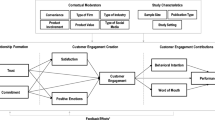Abstract
Some economists believe that social norms are created to improve welfare where the market fails. I show that tipping is such a norm, using a model in which a waiter chooses service quality and then a customer chooses the tip. The customer’s utility depends on the social norm about tipping and feelings such as embarrassment and fairness. The equilibrium depends on the exact social norm: higher sensitivity of tips to service quality (according to the norm) yields higher service quality and social welfare. Surprisingly, high tips for low quality may also increase service quality and social welfare.
Similar content being viewed by others
References
E. Aronson T. D. Wilson R. M. Akert (1999) Social Psychology Addison Wesley Longman New York
Arrow, K. J. (1971): “Political and Economic Evaluation of Social Effects and Externalities.” In Frontiers of Quantitative Economics, edited by M. Intriligator. Amsterdam: North-Holland, pp. 5–25.
O. H. Azar (2003) ArticleTitleThe Implications of Tipping for Economics and Management International Journal of Social Economics 30 1084–1094 Occurrence Handle10.1108/03068290310492878
O. H. Azar (2004) ArticleTitleOptimal Monitoring with External Incentives: The Case of Tipping Southern Economic Journal 71 170–181
O. H. Azar (2004) ArticleTitleWhat Sustains Social Norms and How They Evolve? The Case of Tipping Journal of Economic Behavior and Organization 54 49–64
Azar, O. H. (2004c): ‘‘Is Future Service a Reason for Tipping? Theory and Evidence.’’ Ben-Gurion University of the Negev. Working paper.
O. H. Azar (2004) ArticleTitleThe History of Tipping – from Sixteenth-century England to United States in the 1910s Journal of Socio-Economics 33 745–764
Azar, O. H. (2005a) “Why Pay Extra? Tipping and the Importance of Social Norms and Feelings in Economic Theory.” Journal of Socio-Economics (forthcoming).
Azar, O. H. (2005b) “Who Do We Tip and Why? An Empirical Investigation.” Applied Economics (forthcoming).
U. Ben-Zion E. Karni (1977) Tip Payments and the Quality of Service O. C. Ashenfelter W. E. Oates (Eds) Essays in Labor Market Analysis Wiley New York 37–44
M. Conlin M. Lynn T. O’Donoghue (2003) ArticleTitleThe Norm of Restaurant Tipping Journal of Economic Behavior and Organization 52 297–321
M. Dufwenberg G. Kirchsteiger (2004) ArticleTitleA Theory of Sequential Reciprocity Games and Economic Behavior 47 268–298 Occurrence HandleMR2047583
J. Elster (1989) ArticleTitleSocial Norms and Economic Theory Journal of Economic Perspectives 3 99–117
E. Fehr A. Falk (2002) ArticleTitlePsychological Foundations of Incentives European Economic Review 46 687–724
E. Fehr S. Gachter (2000) ArticleTitleFairness and Retaliation: The Economics of Reciprocity Journal of Economic Perspectives 14 159–181
D. Kahneman J. L. Knetsch R. Thaler (1986) ArticleTitleFairness as a Constraint on Profit Seeking: Entitlements in the Market American Economic Review 76 728–741
M. Lynn A. Grassman (1990) ArticleTitleRestaurant Tipping: An Examination of Three ‘Rational’ Explanations Journal of Economic Psychology 11 169–181
Lynn, M., and McCall, M. (2000): ‘‘Beyond Gratitude and Gratuity: A Meta-analytic Review of the Predictors of Restaurant Tipping.” School of Hotel Administration, Cornell University. Working paper.
Post, P. (1997): Emily Post’s Etiquette, 16th ed. New York: Harper Collins.
B. J. Ruffle (1998) ArticleTitleMore Is Better, But Fair Is Fair: Tipping in Dictator and Ultimatum Games Games and Economic Behavior 23 247–265
B. J. Ruffle (1999) ArticleTitleGift Giving with Emotions Journal of Economic Behavior and Organization 39 399–420
J. Schein E. F. Jablonski B. R. Wohlfahrt (1984) The Art of Tipping Customs and Controversies Tippers International Wausau
Z. Schwartz (1997) ArticleTitleThe Economics of Tipping: Tips, Profits and The Market’s Demand-Supply Equilibrium Tourism Economics 3 265–279
K. Segrave (1998) Tipping An American Social History of Gratuities McFarland & Company Jefferson
Sisk, D. E., and Gallick, E. C. (1985): ‘‘Tips and Commissions: A Study in Economic Contracting.’’ Federal Trade Commission Bureau of Economics. Working paper 125.
W. J. Wessels (1997) ArticleTitleMinimum Wages and Tipped Servers Economic Inquiry 35 334–349
Author information
Authors and Affiliations
Corresponding author
Rights and permissions
About this article
Cite this article
Azar, O.H. The Social Norm of Tipping: Does it Improve Social Welfare?. J Econ 85, 141–173 (2005). https://doi.org/10.1007/s00712-005-0123-0
Received:
Revised:
Published:
Issue Date:
DOI: https://doi.org/10.1007/s00712-005-0123-0




